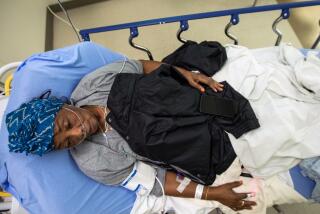Cancer deaths and education: Exploring the link
- Share via
The American Cancer Society’s annual report, released Friday, holds good news for just about everybody: The overall cancer death rate is dropping steadily, and fewer people are getting the dreaded diagnosis in the first place. But as the organization notes, one group has largely been left behind in this march toward progress.
For many reasons — some obvious, some mysterious — people who didn’t get far in school seem to be prime targets for deadly cancer. The cancer death rates are almost three times higher for people who didn’t finish high school than for college graduates. The gap was especially large for lung cancer — which makes sense because people without much education are especially likely to smoke — but it was also strong for all of the major killers, including cancers of the breast, colon and prostate.
Let’s get the obvious explanations out of the way: Uneducated people tend to be relatively poor, they often can’t afford mammograms or colonoscopies or other screenings, they don’t eat as well or as healthfully as wealthier people, and those cigarettes definitely don’t help.
But perhaps there’s more to the story. There seems to be something about the uneducated life that’s just plain unhealthy.
Even when researchers try to take cigarettes, diet and everything else they can think of out of the picture, “people at the bottom education rung still have worse outcomes,” says Dr. Patrick Remington, professor of population health sciences at the University of Wisconsin School of Public Health.
Consider: Researchers at the University of Wisconsin Carbone Cancer Center recently tracked nearly 6,000 women who had been diagnosed with invasive breast cancer. The study found that women who didn’t finish high school were almost 40% more likely to die from the disease than were college graduates. Women with relatively low incomes were about 50% more likely to die than women with significantly higher incomes.
But here’s where things get interesting. After adjusting for access to mammography, the stage of cancer when it was first diagnosed and lifestyle factors such as smoking, the researchers found that the link between income and death rates disappeared. But a lack of eduction was still deadly.
Cancer isn’t the only disease that seems to pick on the less educated. Last year, researchers at Tufts Medical Center in Boston reported that high school dropouts were three times more likely than college grads to suffer heart attacks. Even after the researchers adjusted for smoking, exercise and other lifestyle factors that could threaten the heart, a lack of education still seemed to increase the risk of a heart attack by about 60%.
If researchers could figure out why an educational shortfall is so hazardous, it might be possible to close the health gap. Short of writing a prescription for diplomas, what can be done? Perhaps an attitude adjustment would help. Researchers at the University of Wisconsin reported last year that people at the bottom of the educational ladder tended to have high levels of interleukin-6, an inflammatory protein that’s linked with a wide range of illnesses including heart disease and cancer. But peace of mind offered protection: Less-educated people who said they were happy with their lives and accepting of themselves had the same IL-6 levels as college graduates.
And that’s exactly the problem: Peace of mind can be in short supply for people who dropped out of high school. As Remington explains, “You are constantly told what to do, where to be, and when to be there. You wake up wondering if you’re even going to have a job. That eats away at you.”
The good news is that therapy and counseling can help people feel better about their lives no matter how wealthy they are or how many years they went to school.
Life without a diploma can be stressful and difficult. But it doesn’t have to be short.






